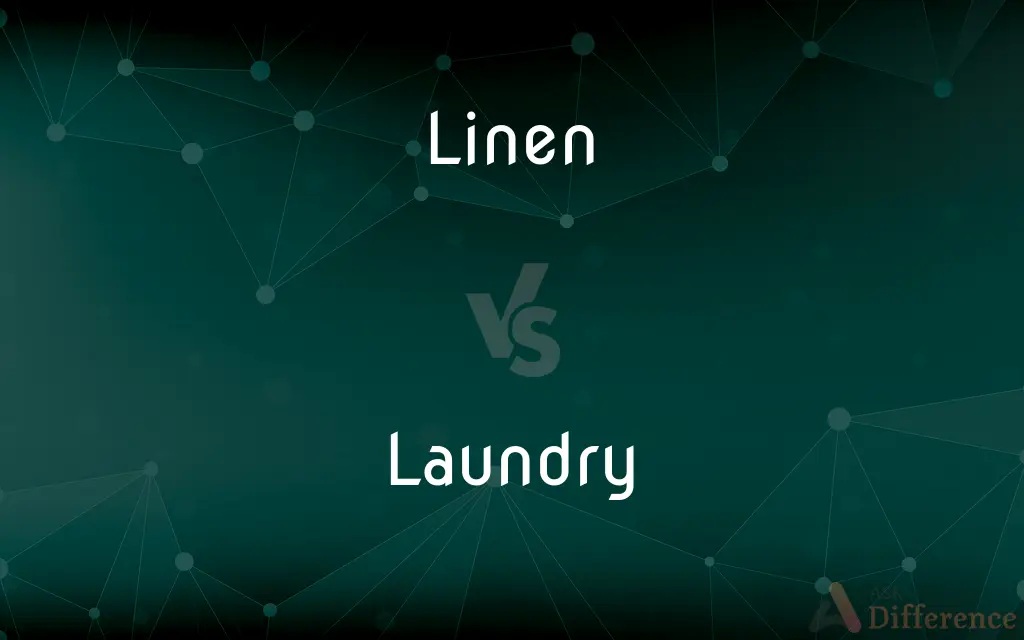Linen vs. Laundry — What's the Difference?
Edited by Tayyaba Rehman — By Maham Liaqat — Updated on March 11, 2024
Linen refers to fabric made from flax fibers, known for its durability and breathability, while laundry encompasses garments or fabrics that need to be washed or have been washed.

Difference Between Linen and Laundry
Table of Contents
ADVERTISEMENT
Key Differences
Linen is a textile made from the fibers of the flax plant, offering strength, breathability, and a natural luster, whereas laundry refers to a collection of clothes or textiles that require washing or have recently been washed. Linen's notable for its use in high-quality bedding and clothing due to its natural properties, including moisture-wicking and comfort. On the other hand, laundry can include a variety of fabrics and garments, each with specific care requirements to maintain their condition and appearance.
While linen is celebrated for its longevity and ability to improve with age, becoming softer with each wash, laundry processes vary widely depending on the fabric types involved, including temperature settings and detergents, to ensure the materials' integrity is preserved. In contrast, the term "laundry" encompasses a broader spectrum of activities, including washing, drying, and folding garments, with specific methods tailored to different fabric types, including linen.
Linen's ecological footprint is relatively low, as flax cultivation requires fewer pesticides and water compared to cotton. This sustainability aspect makes linen a favored choice among eco-conscious consumers. In contrast, laundry practices can have a significant environmental impact, especially regarding water and energy consumption, highlighting the importance of adopting eco-friendly laundry techniques.
Care instructions for linen often emphasize minimal intervention, such as gentle washing and natural drying, to retain the fabric's quality and texture. Meanwhile, laundry care involves a range of practices from stain removal to fabric softening, demonstrating the complexity of maintaining diverse textile types in pristine condition.
Comparison Chart
Material
Made from flax plant fibers.
Can include various fabrics (cotton, polyester, linen, etc.)
ADVERTISEMENT
Purpose
Used for clothing, bedding, and household items.
Washing, drying, and folding of clothes and textiles.
Care
Requires gentle washing and air drying.
Involves specific methods like machine washing, drying.
Sustainability
Eco-friendly, less water and pesticides than cotton.
Depends on practices (e.g., energy and water usage).
Texture
Known for strength, breathability, and becomes softer over time.
Varies widely depending on the fabric type.
Compare with Definitions
Linen
Fabric made from flax plant fibers, known for durability and breathability.
The table was set with fine linen cloth, adding a touch of elegance.
Laundry
The process of washing, drying, and folding clothes and textiles.
I spent my Sunday afternoon catching up on laundry.
Linen
Eco-friendly, with a lower ecological footprint compared to many other fabrics.
Choosing linen curtains supports sustainable living practices.
Laundry
Care practices vary widely, from stain removal to using fabric softeners.
Adding vinegar to the laundry can help brighten colors and soften fabrics.
Linen
Linen is used for a variety of products including bedding, clothing, and household items.
She preferred linen sheets in summer for their cool and comfortable feel.
Laundry
Refers to the collection of items that need to be cleaned or have just been cleaned.
The laundry basket is overflowing again; it's time for another wash.
Linen
Notable for its natural luster and ability to improve with age.
My grandmother's linen dress has softened beautifully over the years.
Laundry
Can have a significant environmental impact based on water and energy consumption.
Using cold water for laundry saves energy and reduces environmental impact.
Linen
Requires specific care, often minimal intervention like gentle washing and air drying.
I wash my linen shirts on a gentle cycle and hang them to dry.
Laundry
Involves various techniques tailored to different fabric types for maintenance.
The label says this sweater needs to be added to the laundry with special care.
Linen
Linen () is a textile made from the fibers of the flax plant. Linen is very strong, absorbent, and dries faster than cotton.
Laundry
Laundry refers to the washing of clothing and other textiles, and, more broadly, their drying and ironing as well. Laundry has been part of history since humans began to wear clothes, so the methods by which different cultures have dealt with this universal human need are of interest to several branches of scholarship.
Linen
Cloth woven from flax
A linen suit
He dealt in Irish linens
Laundry
Soiled or laundered clothes and linens; wash.
Linen
Thread made from fibers of the flax plant.
Laundry
A commercial establishment for laundering clothes or linens.
Linen
Cloth woven from this thread.
Laundry
A room or area, as in a house, for doing the wash.
Linen
Also linens Articles or garments, such as sheets, tablecloths, or underwear, formerly made of linen and now usually made of other fabrics, especially cotton.
Laundry
A laundering; a washing.Can we get some quotes for this sense, and maybe improve its def?
In our family of five, we have to do the laundry every other day.
Linen
Paper made from flax fibers or having a linenlike luster.
Laundry
A place or room where laundering is done - including, by extension, other forms of laundering than clothes washing.
Linen
Made of flax or linen.
Laundry
That which needs to be, is being, or has been laundered.
You've left your dirty laundry all over the house.
Linen
Resembling linen.
Laundry
A penalty flag.
Linen
(uncountable) Thread or cloth made from flax fiber.
Laundry
A laundering; a washing.
Linen
(countable) Domestic textiles, such as tablecloths, bedding, towels, underclothes, etc., that are made of linen or linen-like fabrics of cotton or other fibers; linens.
She put the freshly cleaned linens into the linen closet.
Laundry
A place or room where laundering is done; a laundry room.
Linen
A light beige colour, like that of linen cloth undyed.
Laundry
A business establishment where clothing is laundered for a fee.
Linen
Made from linen cloth or thread.
Laundry
A collection of items such as articles of clothing or bed linens that need to be laundered, or have just been laundered; as, put the dirty laundry in the basket and take it downstairs; hang the laundry out to dry.
Linen
Having the colour linen, light beige.
Laundry
Garments or white goods that can be cleaned by laundering
Linen
Made of linen; as, linen cloth; a linen stocking.
Laundry
Workplace where clothes are washed and ironed
Linen
Resembling linen cloth; white; pale.
Linen
Thread or cloth made of flax or (rarely) of hemp; - used in a general sense to include cambric, shirting, sheeting, towels, tablecloths, etc.; as, bed linens
Linen
Underclothing, esp. the shirt, as being, in former times, chiefly made of linen.
Linen
A fabric woven with fibers from the flax plant
Linen
A high-quality paper made of linen fibers or with a linen finish
Linen
White goods or clothing made with linen cloth
Common Curiosities
What is linen made of?
Linen is made from the fibers of the flax plant.
How does linen compare to cotton in terms of sustainability?
Linen is generally more sustainable than cotton, requiring less water and pesticides.
Can laundry practices impact the environment?
Absolutely, practices such as water temperature and machine efficiency can significantly affect environmental impact.
What's the best way to store linen?
Linen is best stored in a cool, dry place, loosely folded to prevent creasing.
Can all laundry be machine washed?
Not all items are suitable for machine washing; some may require hand washing or dry cleaning.
How can I reduce the environmental impact of my laundry?
Using eco-friendly detergents, washing in cold water, and full loads can help reduce the impact.
Can linen be included in laundry?
Yes, linen can be included in laundry but requires gentle care.
Does the type of laundry detergent matter?
Yes, choosing the right detergent is crucial for different fabric types to preserve their condition.
How often should linen be washed?
Linen should be washed as needed, but less frequently than synthetic fabrics to preserve its qualities.
Is it okay to mix different fabric types in laundry?
It's best to separate laundry by fabric type and color to avoid damage and color bleeding.
Why does linen become softer over time?
The natural fibers of linen break down slightly with each wash, becoming softer without weakening.
What are some eco-friendly laundry tips?
Tips include using biodegradable detergent, lower temperatures, and air drying when possible.
Why is laundry important?
Laundry is essential for maintaining the cleanliness, appearance, and longevity of fabrics.
Is air drying better for linen?
Air drying is preferred for linen to maintain its texture and quality.
Why does linen feel cooler to wear in summer?
Linen's breathability and moisture-wicking properties make it feel cooler and more comfortable in warm weather.
Share Your Discovery

Previous Comparison
Chef vs. Butler
Next Comparison
Wherefore vs. WhereasAuthor Spotlight
Written by
Maham LiaqatEdited by
Tayyaba RehmanTayyaba Rehman is a distinguished writer, currently serving as a primary contributor to askdifference.com. As a researcher in semantics and etymology, Tayyaba's passion for the complexity of languages and their distinctions has found a perfect home on the platform. Tayyaba delves into the intricacies of language, distinguishing between commonly confused words and phrases, thereby providing clarity for readers worldwide.
















































